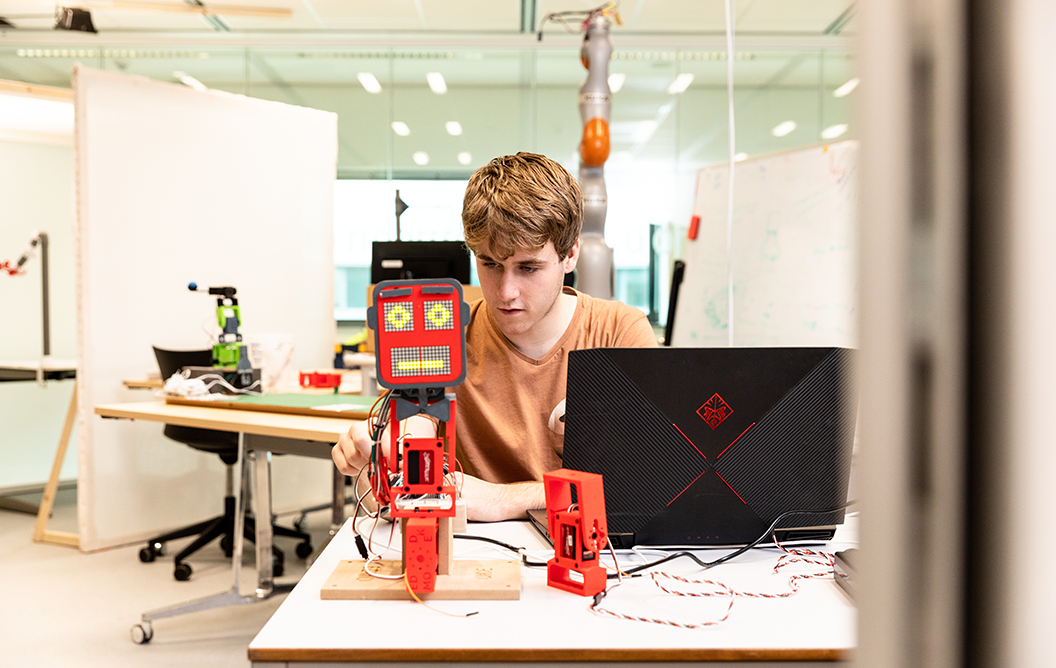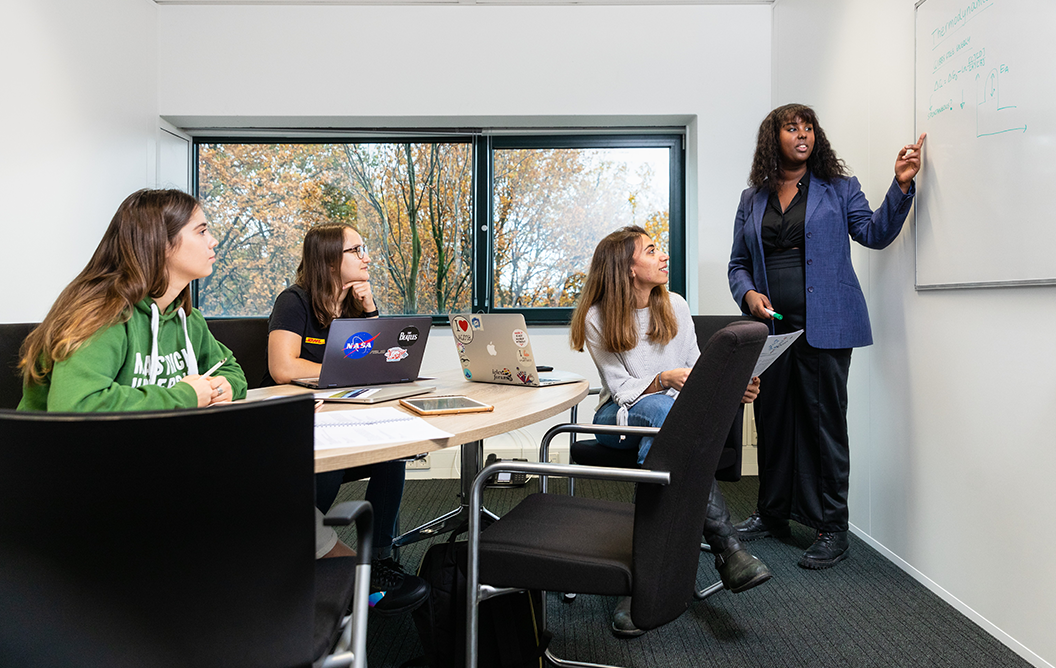CS@Work: information for organisations
Maastricht University's Department of Advanced Computing Sciences places their brightest and most ambitious bachelor's students at partner organisations in the Euregion. With the CS@Work programme, students work in your organisation for three days a week on an interesting academic challenge. For the duration of one year, they tackle a Computer Science related challenge under the supervision of both you and one of our academic staff members.
CS@Work (Computer Science at Work) is an honours track of the Computer Science bachelor’s programme. CS@Works starts in academic year 2025/2026 and is inspired upon our honours programme KE@Work. Since we started the KE@Work programme in 2014, our students have completed projects at a wide variety of organisations such as Accenture, APG, Mediaan and Q-Park.
Why participate in CS@Work?
- Gain access to cutting-edge knowledge in the domain of software development and emerging technologies in Computer Science
- Meet our top 25% students and acquaint them with your organisation before they graduate
- With a programme duration of one year, CS@Work students can be part of a development team and use their bachelor thesis project to solve a problem within your organisation
We are always on the lookout for new partners with challenging projects. Will your organisation be on our upcoming list? Do not hesitate to reach out to us; we will gladly tell you more.
What can CS@Work students do?
To be frank: a lot! CS@Work is an honours track within the Computer Science bachelor’s programme, a programme that combines software development and the use of new computer technologies.
Curriculum and qualifications
Naturally, our bachelor students take courses in computer technology, programming, and the necessary mathematics during their first two years. From the second year onwards, they also get to choose part of their own pathway. For example, during their third semester, they can select a module in “Intelligent Interaction” or “Artificial Intelligence and Machine Learning,” and in the fourth semester, they can choose between “High Performance Computing” or “Cybersecurity and Internet of Things.”
For the CS@Work programme, we select only the best-performing students, who achieve an average score of at least 7.5. Prior to the commencement of CS@Work, we teach them skills that will be useful in the workplace.
It is important to emphasise that the CS@Work students are not left by themselves; each student is guided throughout the entire project by a member of the academic staff from the Department of Advanced Computing Sciences.
What's in it for you?
The CS@Work programme is based on the successful KE@Work initiative, which involved over 60 organisations and nearly 200 students in its first ten years. When Professor Frank Thuijsman launched KE@Work in 2014, he envisioned a ‘triple-win’ structure: a programme that benefits all parties - students, universities, and organisations.
Only the best students
CS@Work students achieve an average score of at least 7.5 and are among the top 25% of their cohort. Instead of traditional group projects, CS@Work students typically work 24 hours a week with an organisation. Following the matching process in March, students will begin working on their yearlong project within the selected organisation in September. Initially, students will be part of a development team, and later they will write a bachelor’s thesis on a topic that aligns with the organisation’s objectives.
CS@Work students bring substantial technical knowledge, particularly regarding newer developments. At the level at which these students operate, they not only learn from you, but you also learn from them!
Furthermore, the CS@Work programme offers a unique opportunity to connect with highly sought-after graduates—even before they enter the job market.
Academic support
Each student is mentored by an academic. This individual is a staff member of the Department of Advanced Computing Sciences and assists the student with the academic challenges of the project.
What is required of CS@Work partner organisations?
Is your organisation located near Maastricht? Are you open to the possibility of collaborating with some of our most talented students for a year? Can you offer a student a place in a development team, and can you provide a challenging issue that the student can base their thesis on?
If your answers to these questions are yes, that is fantastic – these are the key ingredients! In addition, we expect partner organisations of CS@Work to provide the following:
Involvement in the CS@Work trajectory
As a participating company, you are involved in the entire CS@Work trajectory. To match the right students with the right organisations, we organise a CS@Work fair where you can get to know each other. Prior to the event, all participating companies will receive a copy of the CVs that the students have prepared during one of the workshops. During the same week, students will receive a bundle containing a description of all participating organisations and the available projects. In the project description, you can indicate whether it is desirable for the student to have participated in any specific modules from the second year, as described above.
At the CS@Work Fair, you will first meet all participating students. Depending on the number of students and participating organisations, the fair will take place over a full day or an afternoon. During the fair, all organisations will be visited by all students with a suitable background. You can present your organisation and project and ask questions to the student during an 8-minute speed-dating session.
After the fair, you will then list all the students you wish to work with. The students will do the same for all the projects they are interested in. A matching algorithm will ensure that we can start with an optimal pairing of project-student combinations.
Following the matching, we will proceed with signing the contracts.
Throughout the trajectory, there will be monthly contact with the university supervisor. At the end of each semester – twice a year – we will all convene to evaluate the project and discuss the next steps.
Internship compensation
Participation involves a fee that covers both the student's internship compensation and the costs of academic supervision. The total fee amounts to €975 per student per month (excluding VAT).
Get in touch
Any questions? Want to know more? Get in touch with the Department of Advanced Computing Sciences.
Anouk Quaden
CS@Work Coordinator
Anouk runs CS@Work on a daily basis and is your first point of contact for all matters related to CS@Work.
Kurt Driessens
CS@Work Co-coordinator
Kurt is the academic member of the CS@Work team. Previously, Kurt has been a programme director and head of the education committee.
Bas Lemmens
Project Manager DACS
Bas proactively reaches out to local organisations to engage them as CS@Work partners. He is also an enthusiastic entrepreneur in the life sciences technology industry and academic world.

